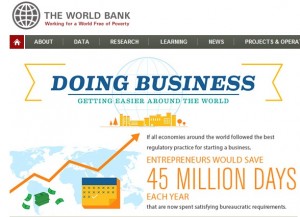Doing business in the Philippines improved significantly last year due to key reforms that made it easier for businesses to get electricity, pay their taxes and secure construction permits, among others.
The latest World Bank “Ease of Doing Business” report, which is published annually, showed the Philippines jumped 30 spots to rank 108th in the world. This was the biggest improvement for any of the 189 countries covered by the report.
“The Philippines was the top performer among top performers. This is the most the Philippines has moved in the 11 years that the ‘Doing Business’ survey has existed,” World Bank senior financial sector specialist Natalya Mylenko said.
The country’s rank is the average of its score in the 10 indicators tracked by the World Bank.
The World Bank report showed the Philippines made gains in seven of 10 indicator measured by the survey. This was a turnaround from the country’s performance the previous year, when the country slipped in seven of the 10 indicators.
The most significant jump was noted in the area of “Resolving Insolvency” where the Philippines improved by 65 spots to 100th.
Gains were also made in Getting Credit (up 43 spots to 86th from 129th), Getting Electricity (up 24 places to 33rd from 57th), Paying Taxes (up 12 spots to 131st from 143rd), Trading Across Borders (up to 42nd to 53rd), Dealing with Construction Permits (up to 99th from 100th), and Registering Property (up to 121st from 122nd).
The National Competitiveness Council (NCC), which leads the multisector effort to improve the ease of doing business in the country, attributed the improvement in the country’s rank to the elimination of certain documentary requirements, guarantees of access to credit information and the introduction of electronic systems for filing contributions.
NCC chair Guillermo Luz also noted the impact of laws such as the Data Privacy Act and Financial Rehabilitation and Insolvency Act, which paved the way for electronic transactions and made it easier for companies to close down, respectively.
Luz said the Philippines was now on track to meeting the government’s goal of getting into the top-third of the list of countries in the report.
“We are right on the trajectory we want to be at the moment. We want to raise it to a steeper curve. I’m very tempted to raise the steepness of this curve,” Luz said.
The report showed the Philippines slipped in two indicators, namely in the areas of Starting New Businesses (down nine spots to 170th from 161st), and Enforcement of Contracts (down three places to 114th from 111th). The country’s rank in Protecting Investors was steady at 128th.
Mylenko said that while the Philippines was able to implement reforms in the three areas, other countries posted more significant gains.
For his part, Luz said he expected the Philippines to maintain or even surpass its performance in the next two to three years, overtaking at least 25 countries at a time.
“It is important for us to keep this type of pace. While we have recorded a big jump, all the gain was this year. We need to maintain this gain year on year on year,” Luz said.
The improvement in the country’s overall rank put the Philippines in 6th among Southeast Asian countries, ahead of Indonesia, Cambodia and Laos. However, the country still lags far behind neighbors like Singapore (1st in the world), Malaysia (6th) and Thailand (18th). Brunei and Vietnam were ranked 59th and 99th, respectively.
